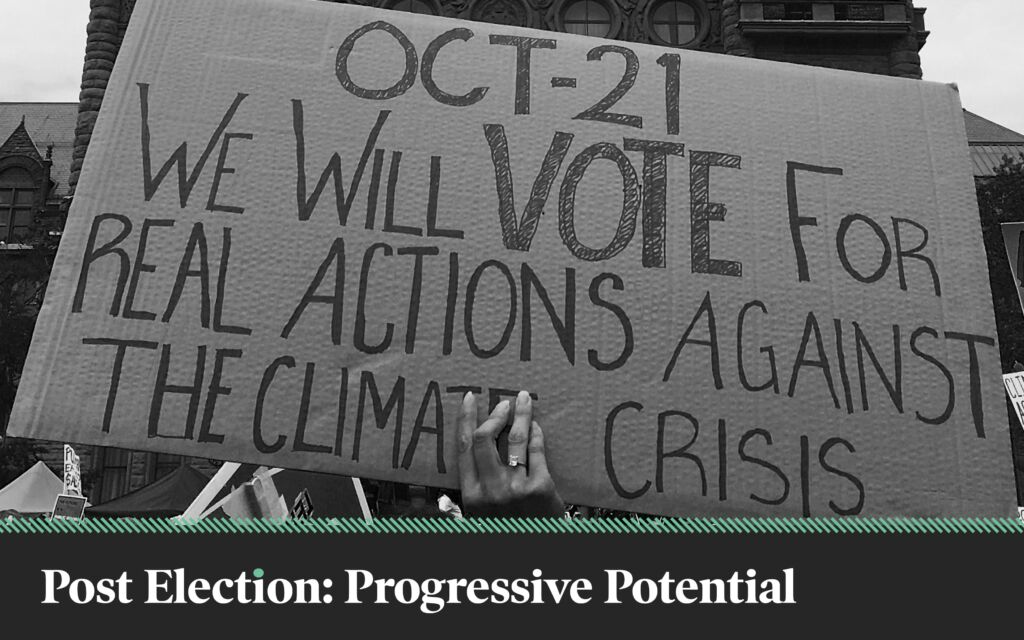Following Monday night’s election, it might feel like the country is more divided than ever. But a closer look at how Canada voted reveals support for a promising suite of progressive initiatives. In fact, the public’s clear desire for progressive policy solutions might just be the one clear winner in the outcome of this election—a minority Liberal government, which has already acknowledged that the electorate delivered them a mandate to work collaboratively with other parties.
Despite this popular mandate, at his first post-election press conference on Wednesday, Prime Minister Trudeau said he expects “progressive” parties to support key parts of the government agenda, starting with a six-billion dollar tax cut.
“I expect them to be able to vote with us,” he stated.
Let’s flip that logic on its head: Millions of Canadians voted for parties besides the Liberals that had progressive policy planks in their platforms, and expect the minority government to earn support from other parties to move those bold ideas ahead.
Vote totals tell more of the story. Fifty-six per cent of voters cast their ballots for parties that supported federal pharmacare and urgent action on affordable housing. Thirty per cent (just shy of the 33 per cent that delivered the Liberals almost half of the seats this election) voted for platforms that pledged to eliminate fossil fuel subsidies, and the same number supported parties that advocated for aggressively ramping up climate action, making changes to the NAFTA 2.0 agreement, moving ahead with a wealth tax on the super rich, and fully implementing the UN Declaration on the Rights of Indigenous Persons. Fifty-seven per cent voted for parties that favoured running deficits over reducing services and budget lines.
(And it’s worth noting that 30 per cent voted for parties whose platforms did not include a broad six-billion dollar tax cut that will result in only small reductions in individual taxes, disproportionately benefit the wealthiest families, and jeopardize our ability to fund important public services.)
After a mandate of half-measures, it’s time to go the distance on progressive promises. As we stated in the 2019 Alternative Federal Budget, which lays out the costed case for exactly how the county can afford to implement these bold progressive policies now, there is simply no time left to lose.
There are a lot of progressive policy solutions to vote for: pharmacare, dental care, money for housing, deliberate and meaningful reconciliation, proportional representation, universal child care, affordable post-secondary education and training, a progressive trade agenda, meeting our Sustainable Development Goals, a more progressive tax system that addresses superwealth accumulation and tax havens, bold action on climate change and a just transition for workers.
Skeptics may wonder if we can afford the additional progressive policies that electoral voting patterns indicate Canadians want to see from their government.
And that’s where the CCPA comes in. We've done the math and we know that investing in progressive policy makes (dollars and) sense.
As the new government takes shape, the CCPA will be here to inform the debate with our rigorous and accessible analysis, our numbers and our expertise. We will, as always, respond to the public’s demand for what’s possible, and government’s responsibility to do better for more people, with the research required to show how to get there. And we will continue to set the standard for high-quality policy analysis that is dedicated to principles of equity, sustainability and community.
The CCPA is ready—with the numbers and the analysis—to demonstrate how to get there, to help ensure political commitments are kept, and to provide the public with tools to advocate for the progressive change they want to see in their communities.
On October 21, Canadians made it clear what progressive policies they wanted to see implemented by their elected representatives. Let’s turn that wish list into a to-do list.
Erika Shaker is Director of Education and Outreach at the Canadian Centre for Policy Alternatives and on Twitter at @ErikaShaker.







